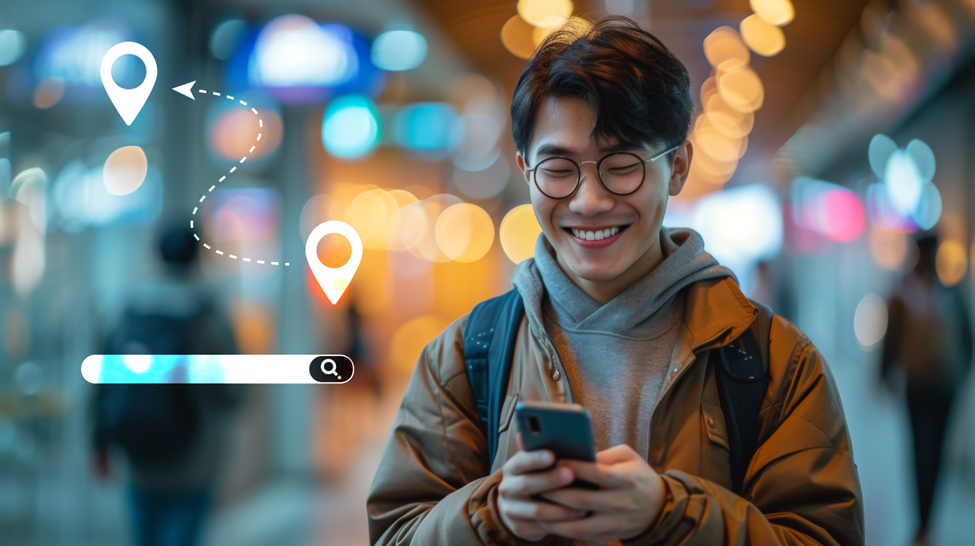ARTICLE AD
Have you ever opened an app and felt like it magically understood exactly where you were and what you were looking for? That’s the brilliance of location-based services (LBS)—they’re not just handy features anymore; they’re revolutionizing customer experience with mobile apps.
If you own a business, you’ve likely seen firsthand how pivotal LBS can be. They draw in foot traffic, streamline deliveries, and target your marketing perfectly, all of which makes life easier for your customers and keeps them coming back.
In 2023, global app downloads reached 257 billion, with only a slight year-over-year increase. Looking ahead, mobile phone apps are projected to generate over USD$ 613 billion in revenues by 2025. This underscores the immense potential of leveraging LBS to enhance your business operations and drive significant growth. [1]
Tailoring App Experiences Just for You
LBS excel in personalizing user interactions. When you know where your users are, you can offer content, promotions, and recommendations that are spot-on. Envision a retail app that alerts you to a shoe sale nearby, or a food delivery app that suggests the closest sushi spot. This precise targeting cuts through the clutter, ensuring that users see only what matters to them.
But it’s not all about ads. Continuously adapting your offers based on customer behavior keeps your app fresh and engaging. Thus, every interaction becomes more meaningful, deepening user engagement with each visit.
Consider the daily conveniences, too. Suppose your users are in an unfamiliar town and need to withdraw money. A quick check on your banking app instantly points them to the nearest ATM. That’s the practical magic of LBS at work in everyday life.
You can visit official websites of reputable LBS providers if you want to learn more about these tools’ benefits and how you can best integrate them with your current systems.
Boosting Your Revenue With Spot-On Ads
Did you know that about 91% of consumers feel more motivated to make a purchase when a brand personalizes its communication specifically for them? These curated messages zero in on who your audience is, what they like, and what they’re most likely to buy. LBS unlock new opportunities for targeted advertising within mobile apps. [2]
By accessing customer location data, you can dispatch ads that are both relevant and timely, boosting conversion chances. This strategy benefits both your business and your customers—they receive promotions that align with their interests, and you enjoy improved marketing outcomes. For instance, a shopping app can notify users about sales or special offers in their area, encouraging immediate visits and, thus, increasing sales.
Local businesses can employ LBS to attract nearby customers with geo-targeted ads, ensuring their marketing strategies are precise. These services also enable apps to provide location-specific perks like discounts or loyalty rewards, enhancing the shopping experience. These tailored offers not only boost revenue but also add value to your app, encouraging regular customer engagement.
Making Deliveries Smooth and Stress-Free
In the world of deliveries and logistics, LBS are nothing short of revolutionary. They provide real-time tracking, which not only makes the delivery process smoother but also more transparent. Knowing exactly when that pizza or parcel is going to show up? That breeds loyalty.
Service providers like Uber Eats or DoorDash are perfect examples—they track the delivery path right to the customers’ doorsteps. And it’s not just about food; logistic apps are optimizing routes and managing fleets more efficiently, making sure everything operates like a well-oiled machine.
And if something goes sideways? LBS help you handle it proactively, keeping your users informed and minimizing their hassle.
Real-Time Updates: Keeping You in the Know
Real-time location updates are a massive perk of LBS. Users get the latest on everything from traffic jams to sudden rainstorms. These updates can be lifesavers, helping users make smarter, quicker decisions.
Navigation apps like Google Maps or Waze are prime examples. They use LBS to cut through the traffic, possibly saving the day when you’re running late. Or take weather services apps—they use LBS to toss up precise weather warnings, so you know exactly when to grab that umbrella. This promptness can make a user feel like your app truly understands and looks out for their needs. [3]
Even social networking apps get a boost from real-time updates. By knowing where users are, these apps can suggest nearby friends or events, ramping up engagement and making the app feel more like a community hub.
Upping the Ante on Security
User safety is paramount, and LBS play a vital role in ensuring it. By monitoring location information, apps can introduce safety features that protect users in various situations, from in-app purchases to sharing current location with trusted contacts.
Ride-sharing apps like Uber or Lyft implement LBS to secure safety during rides. They monitor trips in real time and include features like emergency buttons or location sharing, providing users with reassurance. This move seems to work as private safety reports state that 99.9% of Uber trips end without a safety incident. [4]
LBS also bolster the security of mobile transactions. Banking apps employ user location data to detect unusual activity and prevent fraud, safeguarding financial details. This enhanced security increases trust in using mobile apps for sensitive transactions.
Wrapping It Up
Location-based services are seriously shaking up how mobile apps operate—making them smarter, more considerate, and more integrated into your users’ daily lives. As this tech continues to evolve, it’s clear that the apps of the future will not only serve you better but will also bring users closer to a world where digital experiences feel seamlessly woven into real ones.
References:
“Number of mobile app downloads worldwide from 2016 to 2023,” Source: https://www.statista.com/statistics/271644/worldwide-free-and-paid-mobile-app-store-downloads/ “The Truth In User Privacy And Targeted Ads,” Source: https://www.forbes.com/sites/forbestechcouncil/2022/02/24/the-truth-in-user-privacy-and-targeted-ads/ “Navigation Apps Changed the Politics of Traffic,” Source: https://www.bloomberg.com/news/articles/2019-11-12/navigation-apps-changed-the-politics-of-traffic “Rideshare safety and statistics,” Source: https://www.bankrate.com/insurance/car/rideshare-safety-statistics/
 3 months ago
50
3 months ago
50 


